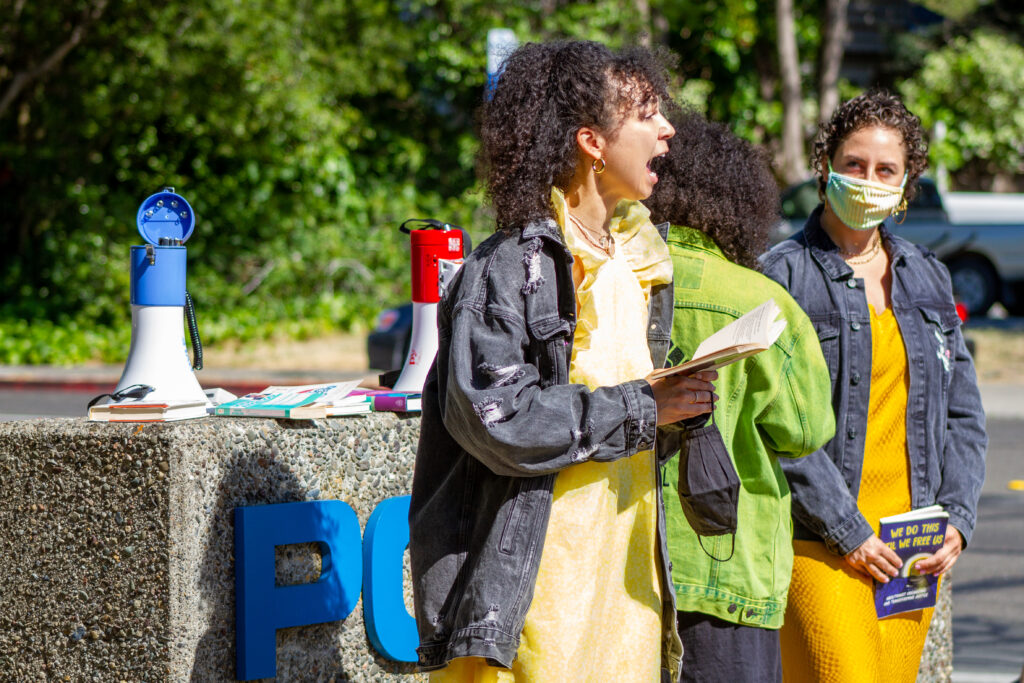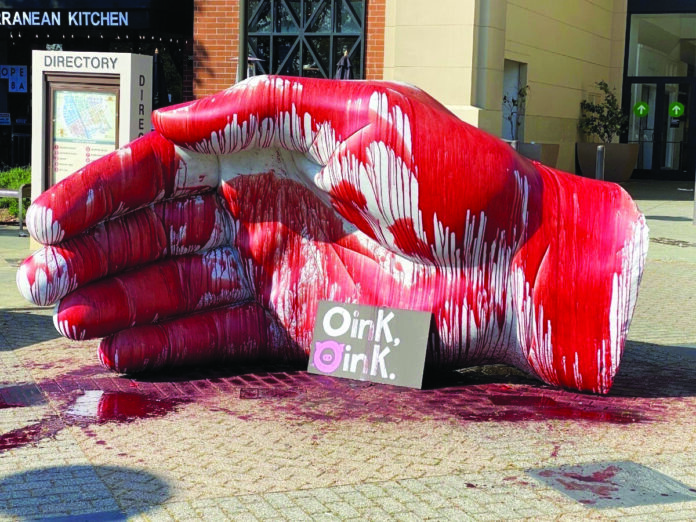With her phone and handgun by her side, a Santa Rosa woman said she lay awake every night of the Derek Chauvin murder trial in mid-April 2021.
She was anxious because Barry Brodd, her ex-husband, testified as a defense witness as an expert on use-of-force, saying he felt it was “justified and objectively reasonable” of Minneapolis Police Officer Chauvin to kneel on George Floyd’s neck. Brodd said the action—which killed Floyd—wasn’t painful and, thus, Brodd didn’t even consider it a use of force.
The Chauvin trial and Brodd’s testimony kept a lot of people up at night; Floyd’s murder set off international protests against police brutality and for racial justice, including some of the biggest protests in Santa Rosa history.
When Brodd’s ex learned that her former husband would be a defense witness at the trial, she installed Ring security cameras outside the home they used to share. Before becoming a private consultant on police practices and use of force, Brodd worked for 22 years as a police officer at the Santa Rosa Police Department and for 35 years as an instructor at the Santa Rosa Public Safety Training Center.
Brodd moved out of state in 2020, yet his ex feared his testimony and his long career in Santa Rosa might endanger her life.
Last week, Brodd’s ex, who asked that the court refer to her as Jane Doe, shared her story at the beginning of a two-day preliminary hearing in Sonoma County Superior Court. The crimes in question, though bloody, weren’t an attempt on her life, but rather a night of vandalism that made national news and prompted a costly SRPD investigation. The evidence presented shed light on some of the impact Floyd’s murder had in Santa Rosa, thousands of miles away from Minneapolis.
A few nights after Brodd’s testimony, Doe’s Ring app on her phone pinged her with an alert around 3am. On the camera, she saw a person in her yard, so she called 911 and went to her window, Glock in hand. There, she saw a person throw something on her house and run away. Reviewing footage later, she and detectives learned four masked people actually visited her house. The group apparently splashed pig’s blood on her garage door, porch and front door, and left a severed pig’s head on her doorstep.
Around the same time Doe’s house was vandalized, people also vandalized the Agraria hand-shaped marble sculpture outside Santa Rosa Plaza Mall, coating it in blood and leaving a painted sign that said “Oink Oink” leaning against it.
In May 2021, SRPD arrested five local activists, initially charging all of them with felony vandalism and felony conspiracy to commit a crime. One defendant, believed to have created the “Oink Oink” sign at the sculpture, later pled guilty to reduced misdemeanor charges. Her case was dismissed after she completed a diversion program.
When the five were arrested, far-right media outlets and influencers shared their photos and personal information online, some calling them “BLM-Antifa extremists” and “militants.” Kristen Aumoithe and Amber Lucas, two of the defendants, said they faced numerous death threats from strangers.

The Evidence Presented
Last week, Hon. Judge John Behnke heard the cases against defendants Aumoithe, Lucas, Colin Metcalfe and Christina Henry.
At a preliminary hearing, a judge hears the prosecution’s case against defendants and determines whether there is probable cause a crime was committed and probable cause the defendants committed it. The prosecution called four witnesses.
Doe testified that the blood left stains and debris that could not be removed, so she had to replace her garage door, front door and vinyl windows. She spent $2,500 to pay her insurance deductible, though the damages were around $35,000, well beyond the $400 threshold of felony vandalism. She said she feels vulnerable and violated, still sleeping with her gun beside her.
SRPD officer Nolan Cleall and Sgt. Ryan Hepp testified about their investigation of the defendants. An anonymous phone tip from a butcher eventually led Cleall to get a search warrant for surveillance footage and receipts at Sonoma County Meat Company, where he said Kristen Aumoithe placed a special order for two gallons of pig’s blood.
Officers surveilled Aumoithe and her friends before serving search warrants at her home and Lucas’ home. They seized laptops and smartphones from the defendants, accessing text and audio conversations on the application Signal between Aumoithe, Lucas, Metcalfe and others.
Aumoithe’s lawyer, Vincent Barrientos, said there was more than 200 gigabytes of discovery in the case. On the stand, Hepp told Lucas’ lawyer, Omar Figueroa, the investigation probably took hundreds of hours of police time.
The prosecution alleged that on April 13, 2021, Aumoithe and Lucas, reacting to Brodd’s testimony, discussed the idea of vandalizing Brodd’s home. Later, they also discussed vandalizing the Agraria sculpture, which was defaced at least twice during the Black Lives Matter protests that began in 2020.
After her arrest, Lucas gave a statement to SRPD before she retained Figueroa. Lucas said she and Aumoithe vandalized the sculpture the same night Metcalfe and Henry vandalized Doe’s home. Lucas said she and Aumoithe had no part in vandalizing Doe’s home.
Barrientos and Figueroa both argued their clients only poured blood on the Agraria sculpture.
While investigators do not believe Lucas or Aumoithe went to Doe’s house, they presented evidence that the two spoke about the idea on April 13 and discussed inviting Metcalfe to participate in the blood vandalism. Later, Aumoithe bought blood and gave some of it to Metcalfe.
On Wednesday, June 7, attorneys for each of the four defendants filed motions asking that their clients’ charges be reduced to misdemeanors. Barrientos sought military diversion in lieu of a trial for Aumoithe, a veteran U.S. Marine.
Judge Behnke said if the vandalism of the hand sculpture was the only crime, he would likely accept everyone’s motions, but he could not in good conscience reduce the vandalism of Doe’s home to a misdemeanor.
However, only three of the four defendants will face charges. Behnke said the prosecution did not present sufficient evidence that Christina Henry participated in either the conspiracy or the vandalism itself. Behnke dismissed Henry’s case.
If found guilty, the maximum sentence Aumoithe, Lucas and Metcalfe could face is three years eight months in state prison.
Barrientos was upset that Behnke did not consider his request for military diversion, which is only applicable to misdemeanor offenses. A decorated veteran of the U.S. Marine Corps, Aumoithe toured Afghanistan twice before she was honorably discharged. Barrientos said Aumoithe is exactly who the program is designed for.
Aumoithe said she returned from war with diagnosed PTSD. She said she experienced many abuses of power during her time in the military and faced racist bullying by once friends when she married a Black Marine and started a family. George Floyd’s murder and Chauvin’s trial troubled her.
“Witnessing the same [abuses of power] play out again by people in power—police, who are supposed to serve and protect—was triggering,” Aumoithe said.
If found guilty, Aumoithe might still be offered the opportunity to participate in Veterans Court, a California program that allows qualified veterans to face probation and undergo court-ordered treatment as a consequence of a felony conviction, instead of serving time in jail or prison.
The defendants will appear on July 20 for arraignment, where, unless the prosecution offers a plea bargain, a pre-trial hearing and trial dates will be set.









